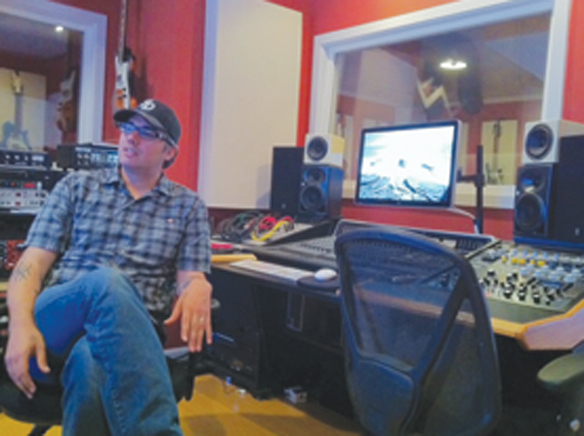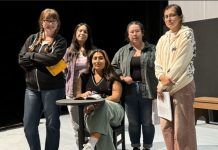Pivotal, the image of Mike Butler is renowned and strangely accessible within our tight-knit local music community. With a solid reputation that preceded his arrival to the San Diego area and La Mesa, he’s happily taken up residence, Butler is shaping the core essence as the uniquely insular landscape of San Diego’s current music scene. Having worked in L.A. as engineer with some of today’s music heavyweights, Butler is as excited to direct his focus exclusively to what talent awaits to be mined in our own back yard. At his Lost Ark Studio,
Pivotal, the image of Mike Butler is renowned and strangely accessible within our tight-knit local music community. With a solid reputation that preceded his arrival to the San Diego area and La Mesa, he’s happily taken up residence, Butler is shaping the core essence as the uniquely insular landscape of San Diego’s current music scene. Having worked in L.A. as engineer with some of today’s music heavyweights, Butler is as excited to direct his focus exclusively to what talent awaits to be mined in our own back yard. At his Lost Ark Studio,
Butler’s affinity for Americana and a preference for “tactile” or “organic” sound is what drives him as a producer, though he makes it clear that his taste is omnivorous and is not easily confined to any genre.
A move from L.A., three years ago, prompted by a job offer for his wife, welcomed by the music producer and family man, helped fulfill the vision of raising his two young boys someplace that would prove more community oriented. Butler said his love for his La Mesa neighborhood has provided what he and his wife consider great schools and community involvement, while still fostering his great passion for music.
“When we moved here and found La Mesa, we were very happy,” he said. “We love the more relaxed life style of our East County neighborhood and all it has to offer, form the great schools to a sense of being connected to our community.”
Having undertaken some self-admittedly ambitious projects, such as “The Lost Ark Studio Compilation” series spanning 52 artists in as many weeks, Butler produced albums for local acts such as Transfer, Nena Anderson, Low Volts, Silver Strands, Stephen Ray, Joanie Mendenhall and Blackout Party, that garnered Best Local Recording for “Closed Mouths Don’t Get Fed” album at the San Diego Music Awards.
Conceding that the relationship between an artist and a producer is akin to a love match, Butler said it is a union that is fueled, predominantly, by trust.
“It’s all about mutual connection,” he said. “People have trusted me with their records and I’m really grateful for that, because at the end of the day, I want them to walk away knowing that this is the best experience and that our collaboration has produced the very best work that we could possibly derive.”
ECC: “What do you like about the local music scene?”
MB: “It’s a great scene. Each band seems to be very encouraging of each other. There’s a real supportive community of people that support local bands and music that’s definitely different from L.A. I think it’s rare to find a music community, or community, in general, that has a support of the local arts. People here care about the craft of writing a song.. Coming here from L.A. was really refreshing to see a bunch of people that cared about writing songs and a community that came out to see them. A community that cared more about the substance, rather than the style.”
ECC: “What do you look for in an artist? Do they come to you or do you find them?”
MB: “Some come to me. Sometimes I find them. I think I just look for an artist or a band that, number one, has great songs and are compelling as performers. I like to believe what they’re saying. I like to see a band and feel that what they’re singing about is real. Obviously, if I have a personal connection to the music–that’s first. If I walk into a place and I see a band for the first time and there’s an immediate feeling about their music and like it instantly, that’s the first step..”
ECC: “Do you go to local venues to hear emerging talent?”
MB: “I do, but it’s getting more difficult the busier I get. But I’m also fortunate enough that the artists I do work with can find me through word of mouth. People recommend an artist I check out. . And now with the net and Facebook, it’s so much easier. I hear about bands all the time. I’m constantly searching for new talent and this makes it so much easier to go to their Facebook page and listen to their music. If I really like them, I’ll go see them live.”
ECC: “What advise do you have for someone who is unknown and wants to get into music?”
MB: “I think if they want to approach it as though they are starting a business and that it’s not a hobby, it’s the right approach. That you now have two jobs. Just playing music and writing songs isn’t enough. If you want to make a living, frankly, I think this part is lost on people. While they get the part that feeds their artistic side, the creating of the music and playing for people–that’s not the work.”
ECC: “What is your role in this equation?”
MB: “I can take a good artist and help them make a good record. That’s where my job ends. To get that record and get it heard and build a career out of that, is up to them.”
ECC: “Are you in touch with any Artists & Repertoire, (also known as scouts from record labels)?”
MB: “Yes and no. The business changes so rapidly and it’s just not the way it used to be. It’s very much a D.I.Y. system now. The days of labels taking an unknown and making them a star have been over for years. Now labels are only looking for people that have already established themselves. I think a lot of artists have the impression that it’s still the way it used to be and that someone’s going to come along and do everything for them.”
ECC: “What is the genre that you work with?”
MB: “It’s fairly wide, but if I had to name a category, I’m most comfortable with roots in Americana and rock that’s more organic, less modern rock and sort of, I don’t like the word “classic rock,” but sort of sonically, I gravitate towards music that’s more organic. If it’s really great and it moves me, then I’ll want to work on it. I’ll want to do it. I’m singer-songwriter motivated. I do have what I gravitate toward and what I feel I am best at, but I also don’t want to do the same thing. If there’s something else that’s interesting and that I want to hear, then I want to work on it. Even anything sort of spooky soundtracky, if it’s good I want to record it.”
ECC: “What can an artist expect from your collaboration?”
MB: “I think it’s different for every artist, because every artist has different needs. Sometimes they need help arranging their songs. Sometimes they need help with instrumentation. Sometimes they need parts written. I’ve played guitar since I was 13 years old and I end up playing on a lot of stuff that I produce because I can come up with parts and I can help sort of structure things and play some instruments that other people don’t necessarily play. I can add that to certain records I work with. Mostly, I just try to serve the songs and serve the artist as best I can and help them get their vision out. I want to make it the best that it can be and try to introduce things that they might not have thought of and if they don’t like it, then we go a different way. At the end of the day I want them to walk away saying ‘that was the best I ever sounded. That was the best record I ever made. That was the best experience I ever had in a studio. That’s what I want people to walk away with.”














